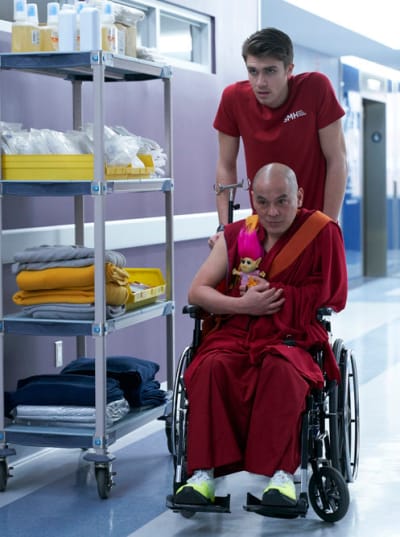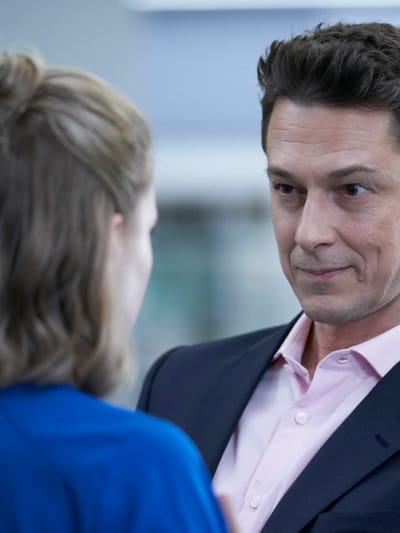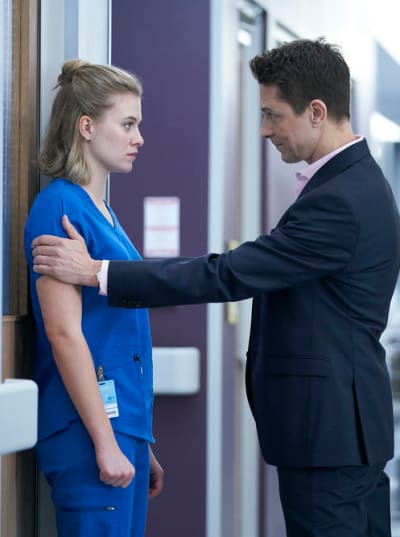When you’re watching a medical show, it isn’t uncommon for death to come up a bit. Nurses Season 1 Episode 4 was all about death. However, death was not the big bad monster, but we must all learn to accept the inevitable journey.
Wolf, our favorite cinnamon bun, was assigned to palliative care. Not unlike hospice care, palliative care is about making a patient feel comfortable as the end approaches.
Palliative care is rather controversial in the medical field. Doctors and nurses are used to seeing death as the enemy. They see it as their job to do whatever necessary to keep their patient alive.
Tenzin: Can you do me an immense favor?
Wolf: Anything. I’m here for you all day.
Tenzin: I worked in palliative care for many years with my brothers at the monastery. We used ritual to travel consciously to death. I hoped to return home to die, but time is not on my side. I will die today.
Wolf: Hey, you can’t, you can’t know that for sure.
Tenzin: I have seen it enough to know. The aura of death is upon me. My brothers will bring the ritual tea and I will go on a trip.
Wolf: A trip?
Tenzin: Inward. Psilocybin is the main ingredient.
Wolf: Shrooms?
Tenzin: We’ve used it for centuries, but it’s misunderstood here.
Wolf: Also, you know, it’s not legal.
Tenzin: Will you protect me from interference so that I may have a good death?
The lengths medical professionals go to prolong life can be incredibly painful for the patient.
While our culture frowns on giving up and certainly doesn’t condone suicide, doctor-assisted or otherwise, there is something to admitting that fighting the battle is too much.
Some people want to enjoy the time they have left without suffering the effects of strenuous treatments.
We know that Wolf has struggled with disease and fear of death from a young age has more trouble with this inevitable end than the other nurses.
He doesn’t think people should die. It doesn’t seem fair or right to him. He doesn’t want to sit back and watch it happen. That’s a stance most of us can get behind. Death is never easy, especially for the people left behind.
Tenzin: What is it friend?
Wolf: I had, uh, leukemia as a kid, and uh, when I was in the children’s ward, every few weeks a bed would just, a bed would just suddenly be empty. Like the kid just disappeared. Do you know how scary that is? Nobody said anything. Guess they didn’t know how to like talk about it. I was terrified. And I hate it. I hate it for what it took and for what it takes. How can you be so happy about death? It’s not right.
Tenzin: Not right. Not wrong. Not good or bad. Just another change.
To show the beauty life can hold, Nurses went the spiritual route, making Wolf’s dying patient is a Buddhist Monk whose monastery usually helps with hospice and palliative care.
Despite Wolf being the nurse, Tenzin was the expert on preparing for the end. It’s always interesting when shows represent other cultures, though I can’t say how much research they did.
Some Buddhist monks are involved in palliative care because it makes a lot of sense to their beliefs. They also have been known to use psilocybin for medicinal purposes.
I couldn’t find anything online about the tea ritual at the end of life, but hopefully, they had a source for that. Tenzin was a fun character, even if he did fall a little into the Buddhist monk stereotype.
As for whether or not drinking the tea was okay considering it is illegal and they were in a hospital, I’m of two minds.
Wolf: Okay, it’s not the drugs. Sure, breaking the law isn’t totally me jam, but it’s the dying part. I don’t know if I can be there when it happens.
Grace: You’re working in palliative care.
Wolf: Oh, I get that it’s a problem.
Keon: Drugs, okay, let me here it, my man.
Wolf: Okay, so he wants to take like this magic mushroom tea. It’s a spiritual thing.
Naz: Okay, well that could destroy a career. Also, prison.
Keon: Yeah, I’ve heard about those palliative monks.They know what they’re doing, but it’s not illegal if it’s religious, right?
Naz: Tell that to the judge.
Keon: If it makes the guy happy … People sneak their own drugs in here all the time, eh.
Ashley: Yeah, why torture yourself? I mean, you know you’re gonna do it. You always want to make people feel good. So just do it.
In regards to Tenzin, Keon is right. I’m no lawyer, certainly not of Canadian law, but religious reasons are a legitimate argument. During prohibition, wine was still allowed for religious purposes.
However, Wolf probably shouldn’t have gotten high. His heart was in the right place. He clearly wasn’t just looking for an excuse to experiment.
That being said, he’s a healthcare provider, and being high at work could be very dangerous for his patients. Luckily, there were no incidents, and it was wicked funny.
Well, in the beginning, it was funny. Later, it veered into philosophical and deep. It was a journey Wolf had to take. Hopefully, he has now made his peace with the fact that people die. Otherwise, working in a hospital will break him.
Grace’s case was a good juxtaposition to Wolf’s. Mrs. Gelson and her husband were in denial about her disease, though many of the treatments they tried were on par with the sort of stuff Tenzin might have recommended.
Grace: There are times in life where we have to choose to act, or not. The higher the stakes, the harder the choice.
Wolf: No! No!
Grace: Nurses face that every day.
Wolf: No! No! Please don’t do it, sir! Let’s talk a bit. My name’s Wolf. What’s your name?
Tenzin: Tenzin. I came here for a final breath of fresh air.
Wolf: Right, Tenzin. Please step off, okay? Come on.
Tenzin: My goodness, what is that? (Laughs) How wonderful to get such an omen. What a beautiful day to die.
Mrs. Gelson wanted to prolong her quality of life. She feared what medication would do to her. She didn’t want to admit that her illness changed things.
Parkinson’s, which Mrs. Gelson had, is a chronic condition. However, people can live for some time without it, and Mrs. Gelson was still in the early stages.
It isn’t easy to admit your body is failing you, but if she accepted it sooner, then she might not have died.
Her death was %100 preventable had different choices been made, and both her husband Jerry and her son Michael will have to live with that.
Still, once she was braindead and comatose, a new question arose, and this comes right back around to palliative care’s advocacy for quality of life.
Mrs. Gelson: You know the great thing about Jerry? He makes me feel like I’m the same person I always was. Like myself. Not Parkinson’s Lady.
Grace: It’s true, you aren’t your illness, or you blood pressure, but they do require treatment.
Someone braindead and comatose is not going to wake up. If by some miracle they do, they may wish they hadn’t. Michael didn’t want to accept that his mother was dead. He wanted to keep her on the machine.
In the end, he came to realize that keeping her alive only technically would only cause her pain and prolong the inevitable.
This episode is about accepting death, the one unchangeable thing. One of the hardest lessons people have to learn, and relearn is how to accept the things they can’t change.
Life isn’t just about that, though. It’s also about having the courage to change the things you can. Grace is struggling with this in her personal life.
Now that doctor a$$hat is her boss again, and she’s terrified. He raped her, and she’s traumatized. She feels helpless. She doesn’t think anyone will listen to her, and she’s scared of what will happen if she steps forward.
Ashley: Did you here bout the new CEO? What are you gonna do?
Grace: What do you want me to do?
Ashley: Nothing, just. Are you okay? Hey, look, I know we’re not tight, but I want you to know I’ve got your back. Whatever you need.
Grace: Mostly, I just need to escape.
Ashley: I can’t help you with that, but I might know some people.
However, if she doesn’t, she knows it’s likely to happen again, and not just to her. The hospital therapist seems keen to get Grace to open up, but she couldn’t do it in the end.
It’s hard to speak up after suffering through a trauma. We don’t blame Grace for struggling. We can also find comfort in the fact that this storyline isn’t over. Grace may speak up sooner than we think.
Aside from being a rape survivor because of her boss, Grace is also having an affair.
Considering Kabir is Indian, and his fiancee looks like she is also, it’s likely an arranged marriage, pressure-to-marry-within-the-culture situation.
That’s ironic, considering Raymond Ablack, who plays Kabir, got his start on Degrassi playing a teenager in a similar situation. Of course, he figured it out before he was grown and engaged.
Kabir: What’s going on, Grace?
Grace: What, you don’t know how a booty call works?
Kabir: Of course I do. Jesus. Are you angry with me?
Grace: No. Yes. Maybe. I don’t know.
Kabir: This is the first time this has felt like, like and affair. It feels dirty.
Grace: Yeah, for you. Whatever, I gotta go.
Kabir: Okay, fine. The whole situation is messed up.
Grace: Yeah, it is. And guess what? You don’t get to have the girlfriend experience when you’ve got a fiancée at home. So for us, dirty is where it’s at.
Kabir did give Grace an option. Maybe it was just talk, but he did tell her that if she wanted a real relationship, they could make that happen. Grace had to admit she doesn’t know what she wants.
She cares for Kabir, but she’s also leaning on him to help her deal with the trauma she went through. Maybe a relationship isn’t what she needs right now, regardless of if it’s with an engaged man or a single one.
Grace isn’t the only one with romance happening, though the other sparks flying were more the exciting kind you get at the beginning of a relationship.
Despite what Caro told Ashley on Nurses Season 1 Episode 3, those two will try and have a relationship.
Detective Arlo Walker: So I had to bring the burglar in. Moron cracked his femur falling off the balcony. Guy offered a wad of cash for a private room, though. I’m in the wrong game.
Sinead: You’re giving me ideas, Arlo. Work your own hours, no taxes. Not sure I’d look good in a ski mask though.
Walker: Hey, uh, I was wondering. You ever get a Saturday night off? You okay?
Sinead: Yeah, uh … would you look at all this. I’m so behind with my schedules.
It may break Caro’s rule about not dating co-workers, and maybe it’ll blow up, but at this point, we can’t bemoan the ship taking off.
Not only was Caro there for Ashley twice now when she needed someone, but they also have so many sparks! When those two kiss, the screen catches fire. They have so much onscreen chemistry. I’m here for it.
Ashley shouldn’t have lied to Sinead about her daughter. She certainly shouldn’t have enlisted Naz and Keon to help her. It is adorable how this little group of nurses has each other’s backs, though.
As for Sinead, it was nice to learn a bit about her. I would never have guessed that she was a recovering addict who nearly lost custody. It does explain why she was reluctant to go out with Officer Walker.
Back on Nurses Season 1 Episode 1, I noted some sparks between her and The Officer. And I was right! They are so cute. Who says only the newbies get a little lovin’?
Keon: Is he high yet?
Wolf: He’s getting there. So am I.
Keon: What?
Wolf: I couldn’t let him do it alone.
Naz: Do you have a career death wish? What are you doing?
Wolf: ‘Kay, well, he needs me. And I can, I can handle myself.
Keon: I believe you, man, but we don’t want you to get fired.
Wolf: That’s why you’re gonna cover me.
Keon: We can try, but I warn you, we have a mixed record on that score.
Other than covering for Ash and Wolf, Naz and Keon didn’t do much this episode. It was reaffirmed that Naz is a straight man and a rule follower if a little arrogant.
Accidently getting Ash in trouble might take her down a few pegs, though.
Her arrogance and entitlement make sense, given her background. It also provides growth potential.
While shorter than in the past, Grace’s beginning and ending voiceover tells us this episode was about change and choice.
The choice to live and die how one wants and the actual death can not change — the assault that Grace can’t change and the choice to come forward.
We would rather be ruined than changed. But everyday we seem to face that choice over and over again.
Grace
The choice to pursue a relationship, the unchangeable past that holds you back from it. The choice to break the rules, the be of use, to help, or to hinder.
All the characters did deal with choices and change, though it was really more about death than anything else. Death is change, and every time we change, who we were before dies and becomes someone new.
This episode had a great message. There were a lot of deep and hard moments, but also funny and romantic ones.
Overall, I think the writers and actors did a great job, and if they keep churning out ones like this, I look forward to what comes next.
Wolf: You sure this is okay?
Tenzin: The psilocybin does is safe.
Wolf: Your friend said he was meant to go with you. What did he mean?
Tenzin: Usually, a guide will take the trip with the dying. But I’m not afraid to go alone.
Wolf: No. No. You shouldn’t be alone. I am your wingman.
Tenzin: My brave friend. Perhaps we were fated to take this journey together.
What about you, Fanatics? Did you think Tenzin and Wolf should have the tea? And how did you feel about the representation of Buddhism?
Did you side with Jerry or Michael? How do you feel about how the show handled death in general? And should Grace come forward? Will she?
Let us know in the comments, and remember, you can watch Nurses online right here via TV Fanatic.
Nurses airs on Tuesdays at 10/9c on NBC.
Leora W is a staff writer for TV Fanatic..










